Related Research Articles

Dahlia Ravikovitch was an Israeli poet, translator and recipient of the Israel Prize for Poetry in 1998.
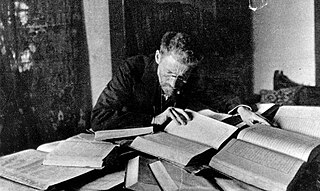
Israeli literature is literature written in the State of Israel by Israelis. Most works classed as Israeli literature are written in the Hebrew language, although some Israeli authors write in Yiddish, English, Arabic and Russian.
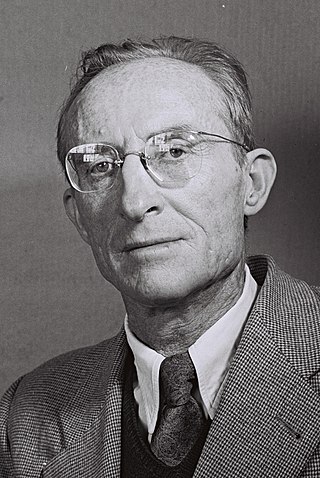
Uri Zvi Greenberg was an Israeli poet, journalist and politician who wrote in Yiddish and Hebrew.
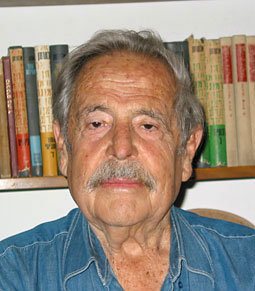
Haim Gouri was an Israeli poet, novelist, journalist, and documentary filmmaker. Widely regarded as one of the country's greatest poets, he was awarded the Israel Prize for poetry in 1988, as well as being the recipient of several other prizes of national distinction.

Avraham Shlonsky was an Israeli poet and editor born in the Russian Empire.

Hebrew literature consists of ancient, medieval, and modern writings in the Hebrew language. It is one of the primary forms of Jewish literature, though there have been cases of literature written in Hebrew by non-Jews. Hebrew literature was produced in many different parts of the world throughout the medieval and modern eras, while contemporary Hebrew literature is largely Israeli literature. In 1966, Agnon won the Nobel Prize for Literature for novels and short stories that employ a unique blend of biblical, Talmudic and modern Hebrew, making him the first Hebrew writer to receive this award.

Nathan Alterman was an Israeli poet, playwright, journalist, and translator. Though never holding any elected office, Alterman was highly influential in Labor Zionist politics, both before and after the establishment of the modern State of Israel in 1948.

Yonatan Ratosh was the literary pseudonym of Uriel Shelach, an Israeli poet and journalist who founded the Canaanite movement.
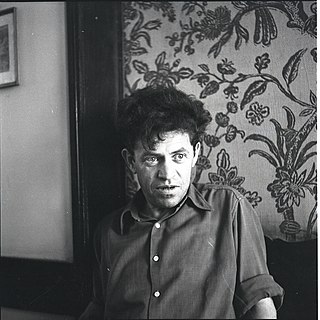
Amir Gilboa was an Israeli poet. Gilboa was awarded the Israel Prize for literature in 1982.

Nathan Zach was an Israeli poet. Widely regarded as one of the preeminent poets in the country's history, he was awarded the Israel Prize in 1995 for poetry. He was also the recipient of other national and international awards. Zach was a professor of Hebrew and comparative literature at the University of Haifa.

Jewish literature includes works written by Jews on Jewish themes, literary works written in Jewish languages on various themes, and literary works in any language written by Jewish writers. Ancient Jewish literature includes Biblical literature and rabbinic literature. Medieval Jewish literature includes not only rabbinic literature but also ethical literature, philosophical literature, mystical literature, various other forms of prose including history and fiction, and various forms of poetry of both religious and secular varieties. The production of Jewish literature has flowered with the modern emergence of secular Jewish culture. Modern Jewish literature has included Yiddish literature, Judeo-Tat literature, Ladino literature, Hebrew literature, and Jewish American literature.

Dan Miron is an Israeli-born American literary critic and author.
The Modern Hebrew Poem Itself is an anthology of modern Hebrew poetry, presented in the original language, with a transliteration into Roman script, a literal translation into English, and commentaries and explanations.
The Movement for Greater Israel, also known as the Land of Israel Movement, was a political organisation in Israel during the 1960s and 1970s which subscribed to an ideology of Greater Israel.

Avidov Lipsker is an Israeli professor of Hebrew Literature at Bar Ilan University in Israel.

Bialik Institute is a research institution and publishing house, mostly dealing with the history and culture of the Hebrew language. It was established in 1935 by the World Zionist Executive and the Executive of the Jewish Agency and named after the Hebrew poet Hayim Nahman Bialik. Its works are mostly published in Hebrew and in English.
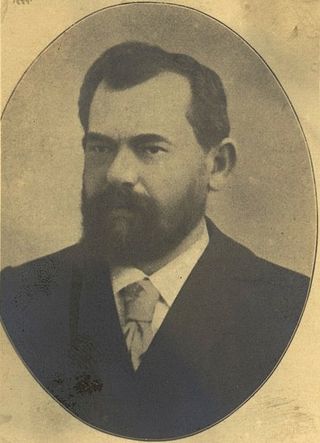
Yehudah Leib ha-Levi Levin, also known by the acronyms Yehalel and Yehalal, was a Hebrew socialist maskilic Hebrew poet, writer, and publicist. His poems were the first to introduce socialist themes into Hebrew literature.
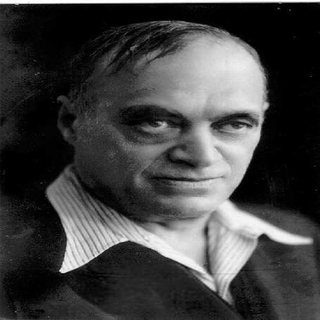
Yehuda Karni was a Hebrew poet, journalist, editor, and translator. He was a recipient of the Bialik Prize in 1944. His poems about Jerusalem made a unique contribution to modern Hebrew poetry.
References
- ↑ Stern, David (2004). The Anthology in Jewish Literature. Oxford University Press USA. p. 287. ISBN 0-19-513751-5 . Retrieved 2009-03-11.
- 1 2 3 Sharon, Moshe, ed. (1988). ""Here and "there" in modern Hebrew poetry (Glenda Abramson)". The Holy Land in History and Thought: International Conference on the Relations Between the Holy Land and the World Outside It. Bill Archive. pp. 141–149. ISBN 90-04-08855-5 . Retrieved 2009-03-11.
- ↑ https://query.nytimes.com/gst/fullpage.html?res=9E0CE1D71131F932A05750C0A967957260&sec=&spon=&pagewanted=all [ dead link ]
- ↑ "Archived copy". Archived from the original on 2012-02-14. Retrieved 2015-02-12.
{{cite web}}: CS1 maint: archived copy as title (link)